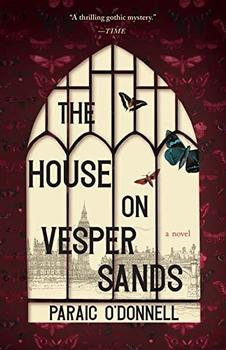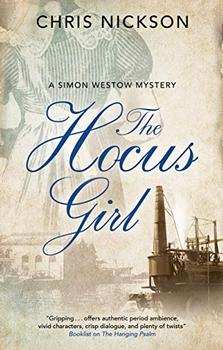Summary | Excerpt | Reading Guide | Reviews | Beyond the book | Read-Alikes | Genres & Themes | Author Bio

When The House on Vesper Sands begins, the reader meets Esther Tull, a seamstress reporting to her employer's house on a wintry night in London, 1893. By chapter's end she has sewn a cryptic message into her skin ("MY SOUL DOTH MAGNIFY THE LORD") and jumped to her death from a second-story window. The narrative then shifts to Gideon Bliss, a young theology student from Cambridge. Gideon has just arrived in London to meet with his uncle, only to discover that he has mysteriously vanished.
Enter Inspector Cutter, an irascible Scotland Yard detective who lives in the same boarding house as Gideon's uncle. Cutter is assigned to investigate the death of Esther Tull, and Gideon, tagging along under the pretense of being a sergeant in training, accompanies him with an agenda of his own. He wants to get to the bottom of his uncle's disappearance, but also that of Angela Tatton, a young woman with whom he is enamored and who he believes to have been kidnapped. The two men embark on an investigation that leads them inexorably to the titular house on Vesper Sands — the remote countryside residence of Lord Strythe (Esther Tull's employer), who may have something to do with a recent series of deaths and kidnappings around London.
The dynamic between Gideon and Cutter is this book's shining jewel: their dialogue is witty and droll — Cutter being a man of few words and Gideon being a man of far too many, a characterization in line with his academic background. The older, bitter, hardened Cutter proves a worthwhile foil to the youthful, romantic Gideon, and the pair's evolving dynamic provides the novel with its emotional center. O'Donnell's humorous dialogue also counterbalances the novel's inherently dark nature, and this contrast between gravity and levity is managed expertly.
The novel's primary weakness, on the other hand, is that O'Donnell stretches his plot too thin, needlessly incorporating a parallel plotline that focuses on Octavia, a female journalist intent on writing something more serious than the frivolous pieces she is usually assigned. While Octavia's research into the dark underbelly of London dovetails with Gideon and Cutter's investigation, the inclusion of her character never fully justifies itself, and only serves to lengthen a book that arguably would have been stronger were it shorter and snappier. Octavia fails to come to life as Cutter and Bliss do; her desire to be taken seriously at work by her male colleagues reads as a generic, impersonal conflict.
However, despite its somewhat sprawling structure, the novel does largely sustain the reader's interest. O'Donnell also incorporates a supernatural element into the plot, which could potentially disappoint those looking for a cut-and-dry murder mystery, but it does serve to add an interesting narrative and thematic layer. The author also successfully paints a portrait of the dark side of Victorian London that is destined to entertain anyone who enjoys neo-Victorian, London-set novels such as Michel Faber's The Crimson Petal and the White or Laura Carlin's The Wicked Cometh. It's a rather slow-paced book, though this isn't a criticism; exposition is handled carefully, and the reader doesn't reach the titular Vesper Sands for much longer than they might expect. However, with a tightly plotted dénouement, it's worth the wait, and a reliably entertaining journey as it all unfolds.
![]() This review was originally published in The BookBrowse Review in January 2021, and has been updated for the
February 2022 edition.
Click here to go to this issue.
This review was originally published in The BookBrowse Review in January 2021, and has been updated for the
February 2022 edition.
Click here to go to this issue.

If you liked The House on Vesper Sands, try these:

by John Shen Yen Nee, S.J. Rozan
Published 2025
Judge Dee and Lao She must use all their powers of deduction—and kung fu skills—to take down a sinister conspiracy between Imperial Russia, Japan, and China in a rollicking new mystery set in 1920s London.
The follow-up to The Murder of Mr. Ma, this historical adventure-mystery is perfect for fans of Laurie R. King and the Guy ...

by Chris Nickson
Published 2020
Thief-taker Simon Westow must save one of his closest friends from a grim fate at the hands of the government in this compelling historical mystery.
Your guide toexceptional books
BookBrowse seeks out and recommends the best in contemporary fiction and nonfiction—books that not only engage and entertain but also deepen our understanding of ourselves and the world around us.